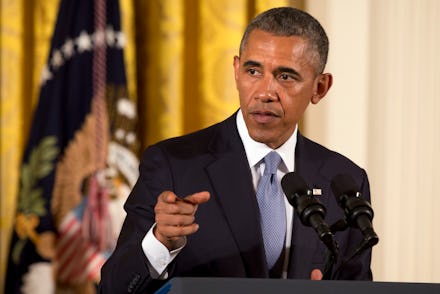Obama's Directive on Transgender Restrooms Reflects His Lasting Legacy on LGBTQ Rights

President Barack Obama made history on Friday, as his administration announced that it would compel public schools to allow transgender students to use the restrooms that match their gender identities — the latest chapter in the chief executive's often-fraught history on LGBTQ rights.
A long and winding journey: Though he swept to power nearly eight years ago promising transformative change, the candidate who spoke of audacity and boldness refused to break with political convention on marriage equality, adhering to the standard Democratic position at the time: While he favored non-discrimination protections, open military service and civil unions for gays, he opposed allowing same-sex couples to marry.
Read more: President Obama Issues Historic Declaration on Trans People in Public School Bathrooms
Three years of concerted pressure — and a vice president who effectively forced his hand — led Obama to endorse marriage equality in 2012, although he disappointed many advocates by adhering to the position that the issue should be adjudicated state-by-state. The president completed his much-ballyhooed "evolution" on the issue in 2014, declaring that same-sex marriage ought to be recognized as a constitutional right nationwide.
The president's shift coincided with a cultural sea change on LGBTQ issues — exemplified by the greater visibility of LGBTQ people in the arts and entertainment, Americans' growing awareness of their LGBTQ friends and relatives and the literal passing away of those who held more traditional views on matters of sexual orientation and gender identity. That cultural transformation helped ease passage of the 2010 law allowing gays, lesbians and bisexuals to serve openly in the military and fostered widespread public support for Obama's executive actions cracking down on anti-LGBTQ employment discrimination by federal contractors.
A lasting legacy: Though many LGBTQ advocates' objectives — including federal legislation banning all workplace discrimination, open military service for transgender people and a sweeping law prohibiting bias in housing, public accommodations and commerce — remain unrealized, they're cheered by the shifts Obama has overseen.
"The Obama admin has taken so many opportunities to ensure that LGBT people receive the basic protections that are needed under the law," Sarah Warbelow, the legal director at the Human Rights Campaign, said.
Warbelow cited administration measures such as "addressing housing discrimination, calling out and investigating conversion therapy, the pending [insurance] regulations which say that if you are an insurance provider you cannot discriminate against transgender people and the [Equal Employment Opportunity Commission] making the determination in 2012 that gender identity discrimination is a subset of sex discrimination."
And while Obama's policy legacy on matters like the Affordable Care Act, financial regulation and immigration reform remains fiercely contested, there's far more durability to the changes he's helped spur on LGBTQ issues.
Young Americans across party lines overwhelmingly support LGBTQ rights, for instance. And changes in public opinion — combined with substantial pressure from business interests — have led conservative Republican governors in South Dakota and Georgia to veto bills that would have, respectively, forced transgender students to use the restrooms of their assigned sex at birth and permitted individuals to deny services to LGBTQ people on religious liberty grounds.
Battles ahead: But Warbelow cautioned against complacency in the LGBTQ community.
As the raging battles over religious liberty protections and North Carolina's law restricting transgender restroom access attest, there's no small measure of resistance to LGBTQ rights. Warbelow also pointed to presumptive Republican presidential nominee Donald Trump's statement that he'd "strongly consider" appointing a Supreme Court justice who'd help overturn the court's ruling for nationwide marriage equality.
Yet Trump also embodies the cultural changes the country has witnessed on LGBTQ issues. The Manhattan billionaire voiced opposition to North Carolina's anti-transgender law, and while he's not in favor of the administration's directive on transgender restroom access in public schools, he opposes the measure based on states' rights grounds — not, for instance, based on debunked claims that such protections will make it easier for sexual predators to sneak into women's restrooms.
Trump has also promised that there will be continued "forward motion" on LGBTQ rights under his administration. But thanks to public opinion and the legacy of his would-be predecessor, a potential President Trump may have no other choice than to pursue that course.